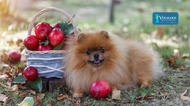Can Dogs Eat Apples?
Posted by Volhard Dog Nutrition on Nov 13th 2025
Crisp, sweet, and packed with nutrients, apples are one of the most popular fruits in the world and a common snack that dog owners are tempted to share.
But while apples can offer dogs a healthy dose of vitamins, fiber, and hydration, not every part of the fruit is safe. From the peel to the core (and even applesauce), it’s essential to know which apple varieties and preparations are beneficial and which could pose a risk.
We’ll explore everything you need to know about feeding apples to your dog, to keep your pup’s snack time both tasty and healthy.
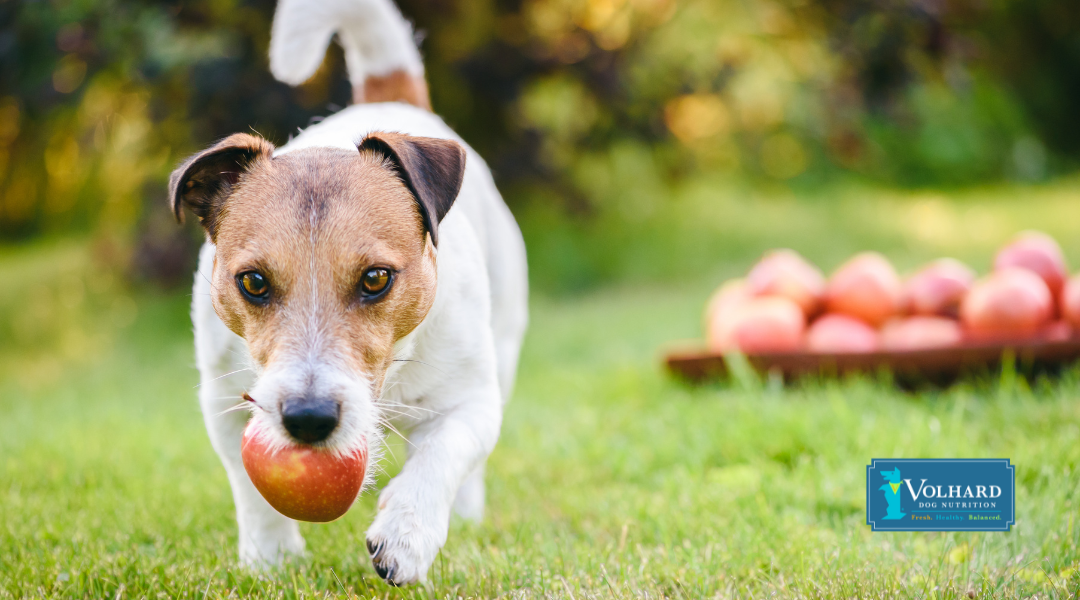
Can Dogs Eat Apples?
Yes, dogs can safely eat apples in moderation! This crunchy fruit is a great, low-calorie treat for most pups. Apples are rich in natural fiber, which supports healthy digestion, and they provide a refreshing source of hydration thanks to their high water content.
Are Apples Good for Dogs?
Apples are packed with vitamins A and C, which support immune health and skin vitality, as well as antioxidants that help combat free radicals and promote cellular health.
The dietary fiber in apples aids digestion and helps maintain regular bowel movements, while the natural sweetness satisfies your dog’s taste buds without added sugars or fats. Apples are a good prebiotic that supports and nourishes the growth of beneficial gut bacteria. They are also great for dental health.
Too many apple slices can lead to stomach upset or diarrhea due to the fruit’s sugar and fiber content. As with any treat, apples should make up no more than 10% of your dog’s daily caloric intake.
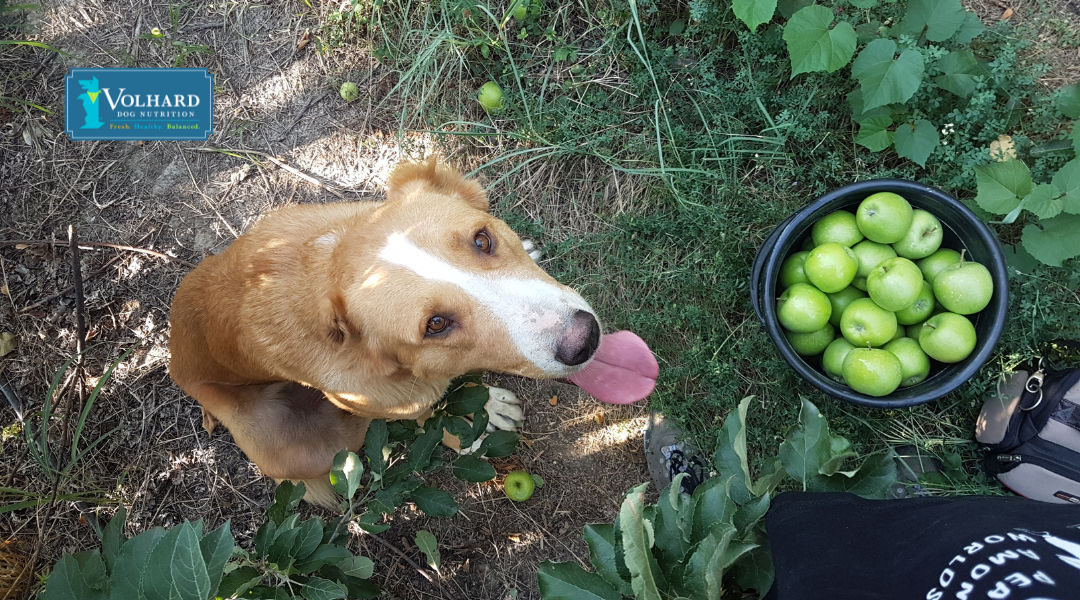
What Kind of Apples Can Dogs Eat?
Most common apple varieties are safe for dogs to eat, as long as they’re fresh, washed, and cored. The key is to avoid any apples that are bruised, fermented, or covered in artificial coatings (like caramel, chocolate, or waxy preservatives).
Always remove the stem, seeds, and core before serving to prevent choking or exposure to harmful cyanide compounds found in apple seeds.
You can serve apples raw as crunchy slices, frozen for a cooling treat, or diced and mixed into your dog’s meal for added texture and flavor.
Can Dogs Eat Green Apples?
Yes, dogs can eat green apples, such as Granny Smiths, and many enjoy their tart flavor. Green apples tend to have less sugar and slightly more fiber and vitamin C than sweeter red varieties, making them a good choice for dogs that need to manage weight or have sensitive digestion.
That said, their tangy flavor may be a bit too sharp for some dogs, so start with small amounts to see how your pup reacts.
Can Dogs Eat Red Apples (Gala, Fuji, Honeycrisp)?
Red apples like Gala, Fuji, and Honeycrisp are popular for their sweetness and crisp texture, making them a natural favorite among dogs. These varieties are rich in antioxidants and vitamin A, supporting immune function and skin health.
However, because red apples are higher in natural sugars, portion control is especially important, particularly for senior dogs or those with diabetes.
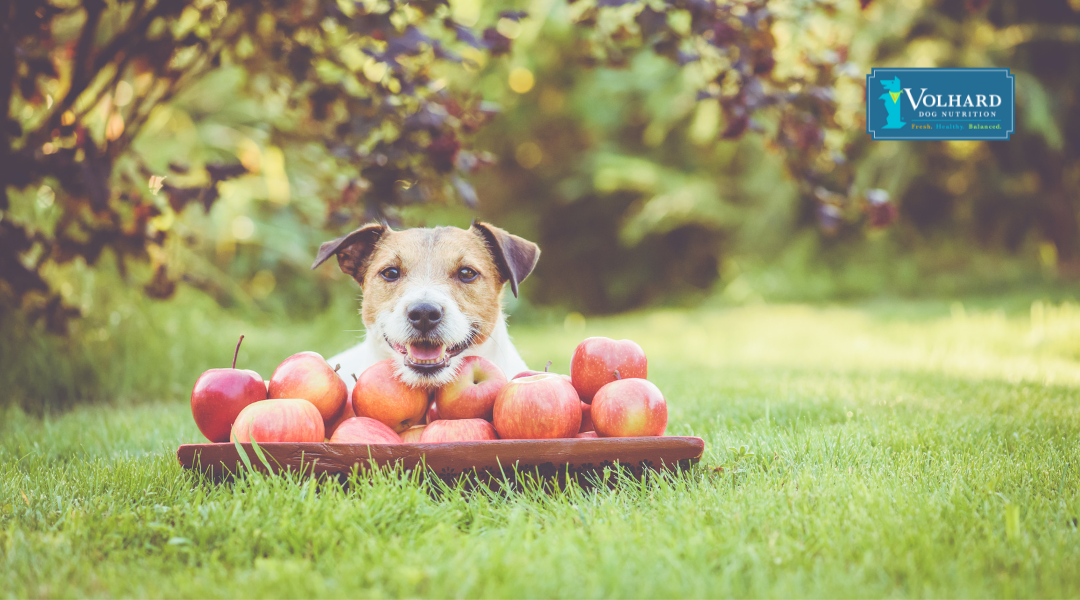
Are Organic Apples Better for Dogs?
Organic apples are generally the better choice for dogs (and humans!) because they’re grown without synthetic pesticides or fertilizers, which can leave chemical residues on the skin. Since many dogs eat apple slices with the peel on, choosing organic apples helps minimize exposure to these substances.
If you don’t have access to organic apples, just wash conventional apples thoroughly with water and a bit of baking soda to remove surface pesticides.
Can Dogs Eat Apple Peels or Skins?
Yes, dogs can eat apple peels! In fact, most of the fiber and antioxidants in apples are found in the skin. Leaving the peel on can support healthy digestion and help maintain steady blood sugar levels. However, make sure the apple is washed thoroughly to remove dirt, wax, or pesticide residue.
If your dog has a sensitive stomach, try offering peeled slices at first—some dogs may have mild digestive upset from the tougher skin.
Should Dogs Eat Apple Cores or Seeds?
No, dogs should not eat apple cores or seeds. The core can be a choking hazard, especially for small breeds, and the seeds contain amygdalin, a compound that releases trace amounts of cyanide when digested.
Can Dogs Eat Applesauce?
Dogs can eat plain, unsweetened applesauce in moderation. Applesauce still offers vitamin C, antioxidants, but minimal fiber. Avoid any products with added sugar, cinnamon, or artificial sweeteners (especially xylitol), all of which can upset your dog’s stomach or be toxic.
Homemade applesauce made from boiled or blended apples is the safest choice. Serve a spoonful as a treat or mix a small amount into your dog’s food for a nutrient boost.
Can Dogs Eat Dried Apples?
Yes, dogs can eat plain, unsweetened dried apples, but only in small amounts. Dried apples are more concentrated in sugar and calories since the water has been removed, so a little goes a long way.
Avoid store-bought dried apple snacks that include additives, preservatives, or sweeteners. When prepared naturally at home or sourced from a dog-safe treat brand, dried apples can be a chewy, shelf-stable alternative to fresh fruit.
Can Dogs Eat Apples Every Day?
While apples are healthy, they should be treated as an occasional snack rather than a daily staple. Too many apples can lead to digestive upset, gas, or loose stools, and the natural sugars can add unnecessary calories to your dog’s diet.
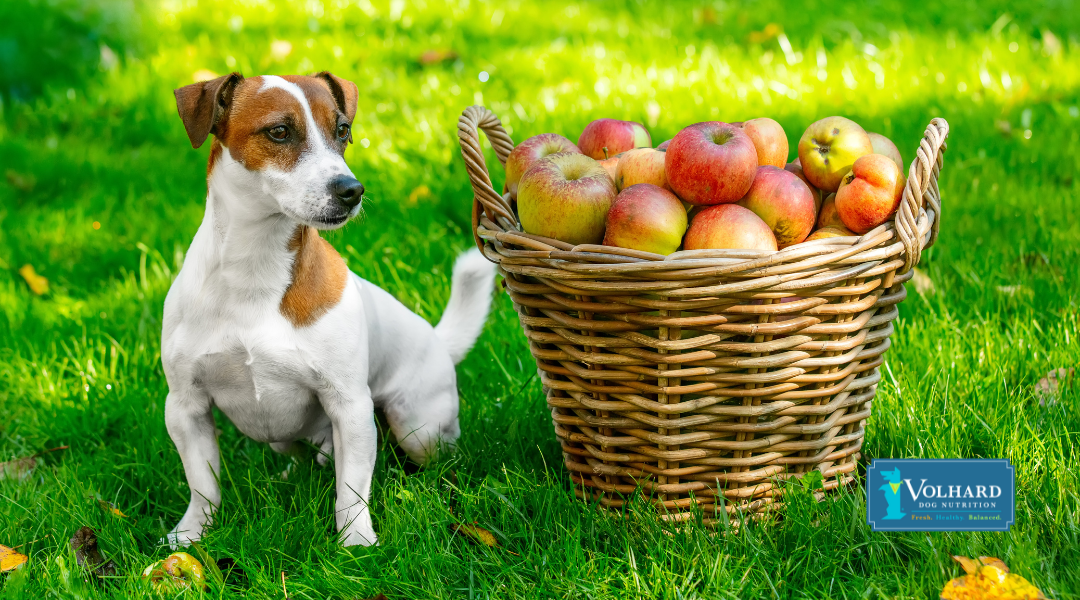
When to Avoid Giving Apples?
While apples are generally safe and nutritious for most dogs, there are times when it’s best to skip them.
- Dogs with Diabetes or Weight Issues
Apples contain natural sugars that can spike blood sugar levels. For dogs with diabetes, insulin resistance, or weight-management concerns, it’s best to limit or avoid apples altogether. Always check with your veterinarian before introducing any sugary fruits to your dog's diet. - Dogs with Sensitive Stomachs or Food Allergies
Some dogs may experience gas, bloating, or diarrhea after eating apples, especially if they’re not used to fruit. Start with a small slice and watch for any signs of discomfort. If your dog shows signs of stomach discomfort or allergy (like itching, vomiting, or swelling), discontinue immediately. - When Apples Are Processed or Sweetened
Avoid feeding your dog apple pie, caramel apples, apple chips with additives, or apples cooked with sugar, cinnamon, or xylitol, all of which can be harmful. Even unsweetened store-bought applesauce may contain preservatives that upset your dog’s stomach. - If the Apple Is Old, Moldy, or Fermented
Overripe or fermented apples can produce alcoholic compounds that are toxic to dogs. Never feed apples that smell sour, appear bruised, or show signs of mold.
How to Safely Prepare Apples for Your Dog
Keep apple treats healthy and safe with these simple steps:
- Choose fresh apples: firm, ripe, and free from bruises or mold.
- Wash well to remove dirt, wax, or pesticides (use a little baking soda if needed).
- Remove the core, seeds, and stem: they can be choking hazards and contain trace toxins.
- Slice into small pieces so your dog can chew safely.
- Keep it plain: no sugar, spices, or toppings like caramel or peanut butter with xylitol.
- Serve in moderation: a few small slices as an occasional treat are plenty.
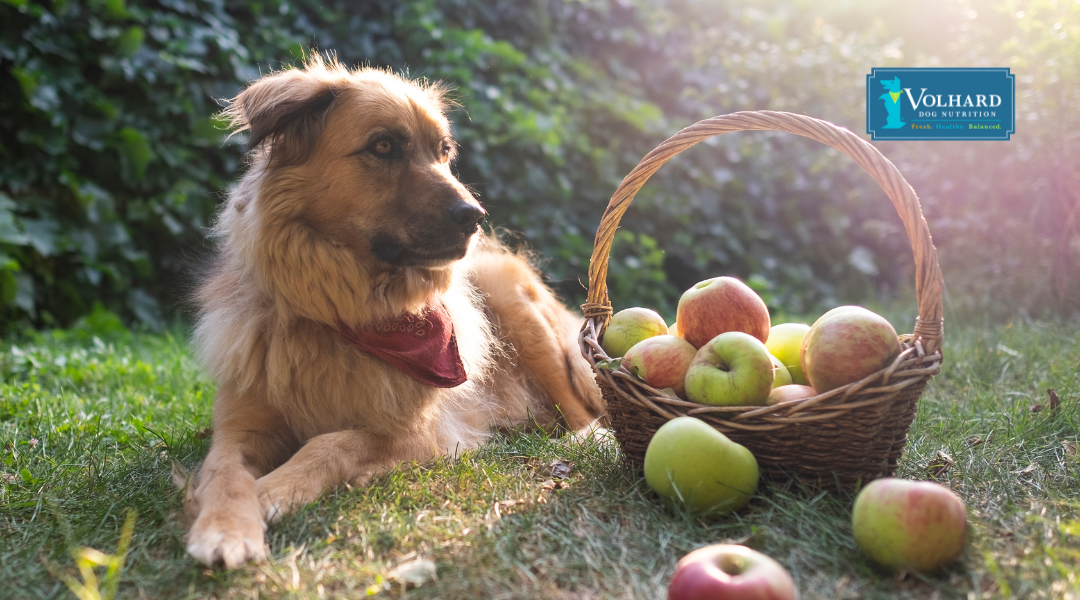
Treat Your Dog to Healthy, Safe Snacks!
For more advice on dog nutrition, health, and training, contact us and check out our other blogs, too!
Volhard Dog Nutrition and its expert canine nutrition coaches offer online consultations to help more dog parents discover why and how to feed their dogs the healthiest foods!
Speaking to a Volhard canine nutrition coach will help you understand the inseparable relationship between healthy food, a healthy body, and a healthy mind.
If you want to contact one of our Volhard canine nutrition coaches, you can do so by utilizing our Live Chat feature or scheduling a consultation.
Reference List
Dossin, Olivier, and Rachel Lavoué. “Protein-Losing Enteropathies in Dogs.” Veterinary Clinics of North America: Small Animal Practice, vol. 41, no. 2, 2011, pp. 399-418. doi:10.1016/j.cvsm.2011.02.002. PubMed
Freeman, Lisa M., Marjorie L. Chandler, Beth A. Hamper, and Lisa P. Weeth. “Current Knowledge about the Risks and Benefits of Raw Meat-Based Diets for Dogs and Cats.” Journal of the American Veterinary Medical Association, vol. 243, no. 11, 2013, pp. 1549-1557. doi:10.2460/javma.243.11.1549.
Swanson, Kelly S., Christine M. Grieshop, Elizabeth A. Flickinger, Laura L. Bauer, Hans-Peter Healy, Karl A. Dawson, Neal R. Merchen, and George C. Fahey Jr. “Supplemental Fructooligosaccharides and Mannanoligosaccharides Influence Immune Function, Ileal and Total Tract Nutrient Digestibilities, Microbial Populations and Concentrations of Protein Catabolites in the Large Bowel of Dogs.” The Journal of Nutrition, vol. 132, no. 5, May 2002, pp. 980-989. doi:10.1093/jn/132.5.980.
American Society for the Prevention of Cruelty to Animals. “Apples.” ASPCA,.

